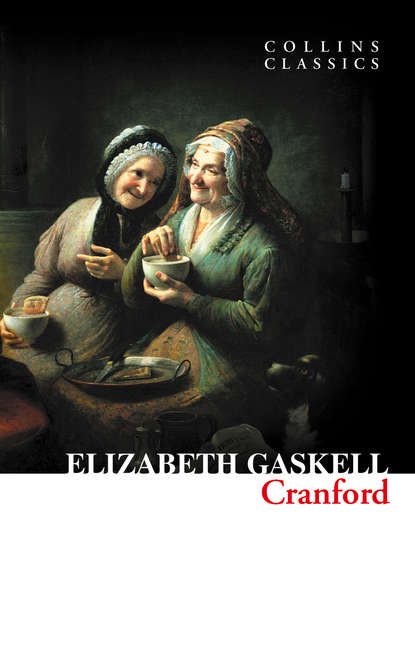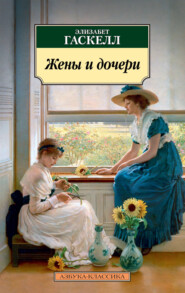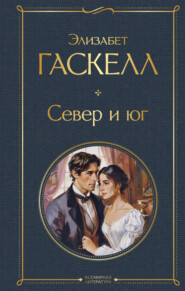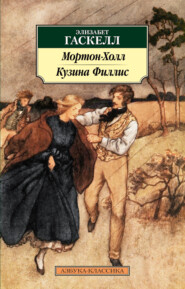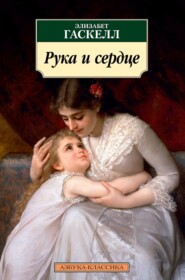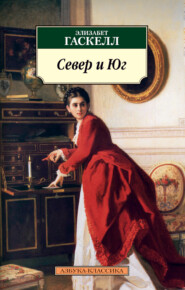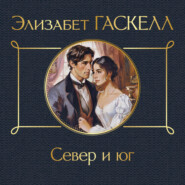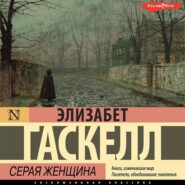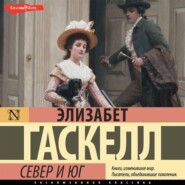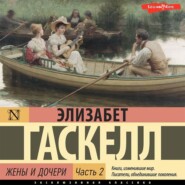По всем вопросам обращайтесь на: info@litportal.ru
(©) 2003-2024.
✖
Cranford
Настройки чтения
Размер шрифта
Высота строк
Поля
“Oh, I don’t know. She was willing enough, I think; but, you know, cousin Thomas would not have been enough of a gentleman for the rector and Miss Jenkyns.”
“Well! but they were not to marry him,” said I impatiently.
“No; but they did not like Miss Matty to marry below her rank. You know she was the rector’s daughter, and somehow they are related to Sir Peter Arley; Miss Jenkyns thought a deal of that.”
“Poor Miss Matty!” said I.
“Nay, now, I don’t know anything more than that he offered and was refused. Miss Matty might not like him—and Miss Jenkyns might never have said a word—it is only a guess of mine.”
“Has she never seen him since?”
“No, I think not. You see Woodley, cousin Thomas’s house, lies half-way between Cranford and Misselton; and I know he made Misselton his market-town very soon after he had offered to Miss Matty; and I don’t think he has been into Cranford above once or twice since—once, when I was walking with Miss Matty, in High Street, and suddenly she darted from me, and went up Shire Lane. A few minutes after I was startled by meeting cousin Thomas.”
“How old is he?” I asked, after a pause of castle-building.
“He must be about seventy, I think, my dear,” said Miss Pole, blowing up my castle, as if by gunpowder, into small fragments.
Very soon after—at least during my long visit to Miss Matilda—I had the opportunity of seeing Mr. Holbrook; seeing, too, his first encounter with his former love, after thirty or forty years’ separation. I was helping to decide whether any of the new assortment of coloured silks which they had just received at the shop would do to match a gray-and-black mousseline-de-laine that wanted a new breadth, when a tall, thin, Don Quixote-looking old man came into the shop for some woollen gloves. I had never seen the person (who was rather striking) before, and I watched him rather attentively while Miss Matty listened to the shop man. The stranger wore a blue coat with brass buttons, drab breeches, and gaiters, and drummed with his fingers on the counter until he was attended to. When he answered the shop-boy’s question, “What can I have the pleasure of showing you to-day, sir?” I saw Miss Matilda start, and then suddenly sit down; and instantly I guessed who it was. She had made some inquiry which had to be carried round the other shop man.
“Miss Jenkyns wants the black sarsenet two and twopence the yard;” and Mr. Holbrook had caught the name, and was across the shop in two strides.
“Matty—Miss Matilda—Miss Jenkyns! God bless my soul! I should not have known you. How are you? how are you?” He kept shaking her hand in a way which proved the warmth of his friendship; but he repeated so often, as if to himself, “I should not have known you!” that any sentimental romance which I might be inclined to build was quite done away with by his manner.
However, he kept talking to us all the time we were in the shop; and then, waving the shop man with the unpurchased gloves on one side with “Another time, sir! another time!” he walked home with us. I am happy to say my client, Miss Matilda, also left the shop in an equally bewildered state, not having purchased either green or red silk. Mr. Holbrook was evidently full with honest, loud-spoken joy at meeting his old love again; he touched on the changes that had taken place; he even spoke of Miss Jenkyns as “Your poor sister!
Well, well! we all have our faults;” and bade us good-bye with many a hope that he should soon see Miss Matty again. She went straight to her room, and never came back till our early tea-time, when I thought she looked as if she had been crying.
CHAPTER 4 A Visit to an Old Bachelor (#ulink_c2aa1f8b-8232-5819-b8ae-5b588e0f21d7)
A few days after, a note came from Mr. Holbrook, asking us—impartially asking both of us—in a formal, old-fashioned style, to spend a day at his house—a long June day—for it was June now. He named that he had also invited his cousin, Miss Pole; so that we might join in a fly, which could be put up at his house.
I expected Miss Matty to jump at this invitation; but, no! Miss Pole and I had the greatest difficulty in persuading her to go. She thought it was improper; and was even half annoyed when we utterly ignored the idea of any impropriety in her going with two other ladies to see her old lover. Then came a more serious difficulty. She did not think Deborah would have liked her to go. This took us half a day’s good hard talking to get over; but, at the first sentence of relenting, I seized the opportunity, and wrote and despatched an acceptance in her name—fixing day and hour, that all might be decided and done with.
The next morning she asked me if I would go down to the shop with her; and there, after much hesitation, we chose out three caps to be sent home and tried on, that the most becoming might be selected to take with us on Thursday.
She was in a state of silent agitation all the way to Woodley. She had evidently never been there before; and, although she little dreamed I knew anything of her early story, I could perceive she was in a tremor at the thought of seeing the place which might have been her home, and round which it is probable that many of her innocent girlish imaginations had clustered. It was a long drive there, through paved jolting lanes. Miss Matilda sat bolt upright, and looked wistfully out of the windows as we drew near the end of our journey. The aspect of the country was quiet and pastoral. Woodley stood among the fields; and there was an old-fashioned garden where roses and currant-bushes touched each other, and where the feathery asparagus formed a pretty background to the pinks and gillyflowers; there was no drive up to the door. We got out at a little gate, and walked up a straight box-edged path.
“My cousin might make a drive, I think,” said Miss Pole, who was afraid of earache, and had only her cap on.
“I think it is very pretty,” said Miss Matty, with a soft plaintiveness in her voice, and almost in a whisper, for just then Mr. Holbrook appeared at the door, rubbing his hands in very effervescence of hospitality. He looked more like my idea of Don Quixote than ever, and yet the likeness was only external. His respectable housekeeper stood modestly at the door to bid us welcome; and, while she led the elder ladies upstairs to a bedroom, I begged to look about the garden. My request evidently pleased the old gentleman, who took me all round the place and showed me his six-and-twenty cows, named after the different letters of the alphabet. As we went along, he surprised me occasionally by repeating apt and beautiful quotations from the poets, ranging easily from Shakespeare and George Herbert to those of our own day. He did this as naturally as if he were thinking aloud, and their true and beautiful words were the best expression he could find for what he was thinking or feeling. To be sure he called Byron “my Lord Byrron,” and pronounced the name of Goethe strictly in accordance with the English sound of the letters—“As Goethe says, ‘Yeever-verdant palaces,’” etc. Altogether I never met with a man, before or since, who had spent so long a life in a secluded and not impressive country, with ever-increasing delight in the daily and yearly change of season and beauty.
When he and I went in, we found that dinner was nearly ready in the kitchen—for so, I suppose, the room ought to be called, as there were oak dressers and cupboards all round, all over by the side of the fireplace, and only a small Turkey carpet in the middle of the flag-floor. The room might have been easily made into a handsome dark oak dining-parlour by removing the oven and a few other appurtenances of a kitchen, which were evidently never used, the real cooking-place being at some distance. The room in which we were expected to sit was a stiffly-furnished, ugly apartment; but that in which we did sit was what Mr. Holbrook called the counting-house, when he paid his labourers their weekly wages at a great desk near the door. The rest of the pretty sitting-room—looking into the orchard, and all covered over with dancing tree-shadows—was filled with books. They lay on the ground, they covered the walls, they strewed the table. He was evidently half ashamed and half proud of his extravagance in this respect. They were all kinds—poetry and wild weird tales prevailing. He evidently chose his books in accordance with his own tastes, not because such and such were classical or established favourites.
“Ah!” he said, “we farmers ought not to have much time for reading; yet somehow one can’t help it.”
“What a pretty room!” said Miss Matty sotto voce.
“What a pleasant place!” said I aloud, almost simultaneously.
“Nay! if you like it,” replied he; “but can you sit on these great, black leather, three-cornered chairs? I like it better than the best parlour; but I thought ladies would take that for the smarter place.”
It was the smarter place, but, like most smart things, not at all pretty, or pleasant, or homelike; so, while we were at dinner, the servant-girl dusted and scrubbed the counting-house chairs, and we sat there all the rest of the day.
We had pudding before meat; and I thought Mr. Holbrook was going to make some apology for his old-fashioned ways, for he began—
“I don’t know whether you like new-fangled ways.”
“Oh, not at all!” said Miss Matty.
“No more do I,” said he. “My housekeeper will have these in her new fashion; or else I tell her that, when I was a young man, we used to keep strictly to my father’s rule, ‘No broth, no ball; no ball, no beef’; and always began dinner with broth. Then we had suet puddings, boiled in the broth with the beef; and then the meat itself. If we did not sup our broth, we had no ball, which we liked a deal better; and the beef came last of all, and only those had it who had done justice to the broth and the ball. Now folks begin with sweet things, and turn their dinners topsy-turvy.”
When the ducks and green peas came, we looked at each other in dismay; we had only two-pronged, black-handled forks. It is true the steel was as bright as silver; but what were we to do? Miss Matty picked up her peas, one by one, on the point of the prongs, much as Amine ate her grains of rice after her previous feast with the Ghoul. Miss Pole sighed over her delicate young peas as she left them on one side of her plate untasted, for they would drop between the prongs. I looked at my host; the peas were going wholesale into his capacious mouth, shovelled up by his large, round-ended knife. I saw, I imitated, I survived! My friends, in spite of my precedent, could not muster up courage enough to do an ungenteel thing; and, if Mr. Holbrook had not been so heartily hungry, he would probably have seen that the good peas went away almost untouched.
After dinner, a clay pipe was brought in, and a spittoon; and, asking us to retire to another room, where he would soon join us, if we disliked tobacco-smoke, he presented his pipe to Miss Matty, and requested her to fill the bowl. This was a compliment to a lady in his youth; but it was rather inappropriate to propose it as an honour to Miss Matty, who had been trained by her sister to hold smoking of every kind in utter abhorrence. But if it was a shock to her refinement, it was also a gratification to her feelings to be thus selected; so she daintily stuffed the strong tobacco into the pipe, and then we withdrew.
“It is very pleasant dining with a bachelor,” said Miss Matty softly, as we settled ourselves in the counting-house. “I only hope it is not improper; so many pleasant things are!”
“What a number of books he has!” said Miss Pole, looking round the room. “And how dusty they are!”
“I think it must be like one of the great Dr. Johnson’s rooms,” said Miss Matty. “What a superior man your cousin must be!”
“Yes!” said Miss Pole, “he’s a great reader; but I am afraid he has got into very uncouth habits with living alone.”
“Oh! uncouth is too hard a word. I should call him eccentric; very clever people always are!” replied Miss Matty.
When Mr. Holbrook returned, he proposed a walk in the fields; but the two elder ladies were afraid of damp and dirt, and had only very unbecoming calashes to put on over their caps; so they declined, and I was again his companion, in a turn which he said he was obliged to take to see after his men. He strode along, either wholly forgetting my existence, or soothed into silence by his pipe—and yet it was not silence exactly. He walked before me with a stooping gait, his hands clasped behind him; and, as some tree or cloud, or glimpse of distant upland pastures, struck him, he quoted poetry to himself, saying it out loud in a grand, sonorous voice, with just the emphasis that true feeling and appreciation give. We came upon an old cedar-tree, which stood at one end of the house.
“The cedar spreads his dark-green layers of shade.”
“Capital term—‘layers’! Wonderful man!” I did not know whether he was speaking to me or not; but I put in an assenting “wonderful,” although I knew nothing about it, just because I was tired of being forgotten, and of being consequently silent.
He turned sharp round. “Ay! you may say ‘wonderful.’ Why, when I saw the review of his poems in Blackwood, I set off within an hour, and walked seven miles to Misselton (for the horses were not in the way) and ordered them. Now, what colour are ash-buds in March?”
Is the man going mad? thought I. He is very like Don Quixote.
“What colour are they, I say?” repeated he vehemently.
“I am sure I don’t know, sir,” said I, with the meekness of ignorance.
“I knew you didn’t. No more did I—an old fool that I am! till this young man comes and tells me. Black as ash-buds in March. And I’ve lived all my life in the country; more shame for me not to know. Black: they are jet-black, madam.” And he went off again, swinging along to the music of some rhyme he had got hold of.
When we came back, nothing would serve him but he must read us the poems he had been speaking of; and Miss Pole encouraged him in his proposal, I thought, because she wished me to hear his beautiful reading, of which she had boasted; but she afterwards said it was because she had got to a difficult part of her crochet, and wanted to count her stitches without having to talk. Whatever he had proposed would have been right to Miss Matty; although she did fall sound asleep within five minutes after he had begun a long poem, called Locksley Hall, and had a comfortable nap, unobserved, till he ended; when the cessation of his voice wakened her up, and she said, feeling that something was expected, and that Miss Pole was counting—
“What a pretty book!”
“Pretty, madam! it’s beautiful! Pretty, indeed!”
“Oh, yes! I meant beautiful!” said she, fluttered at his disapproval of her word. “It is so like that beautiful poem of Dr. Johnson’s my sister used to read—I forget the name of it; what was it, my dear?” turning to me.





